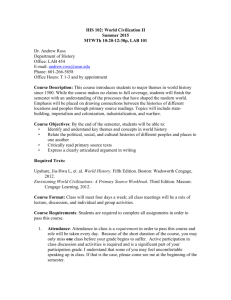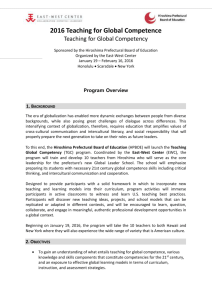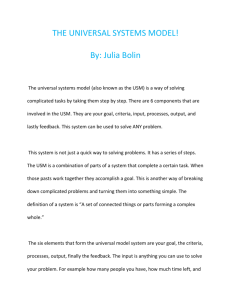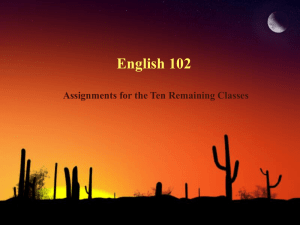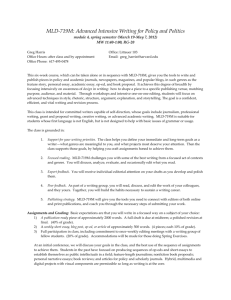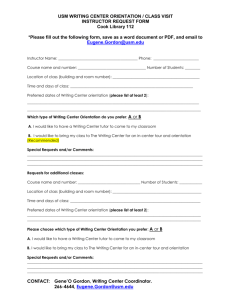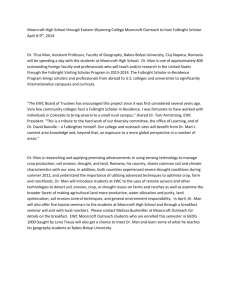World Civilizations II
advertisement
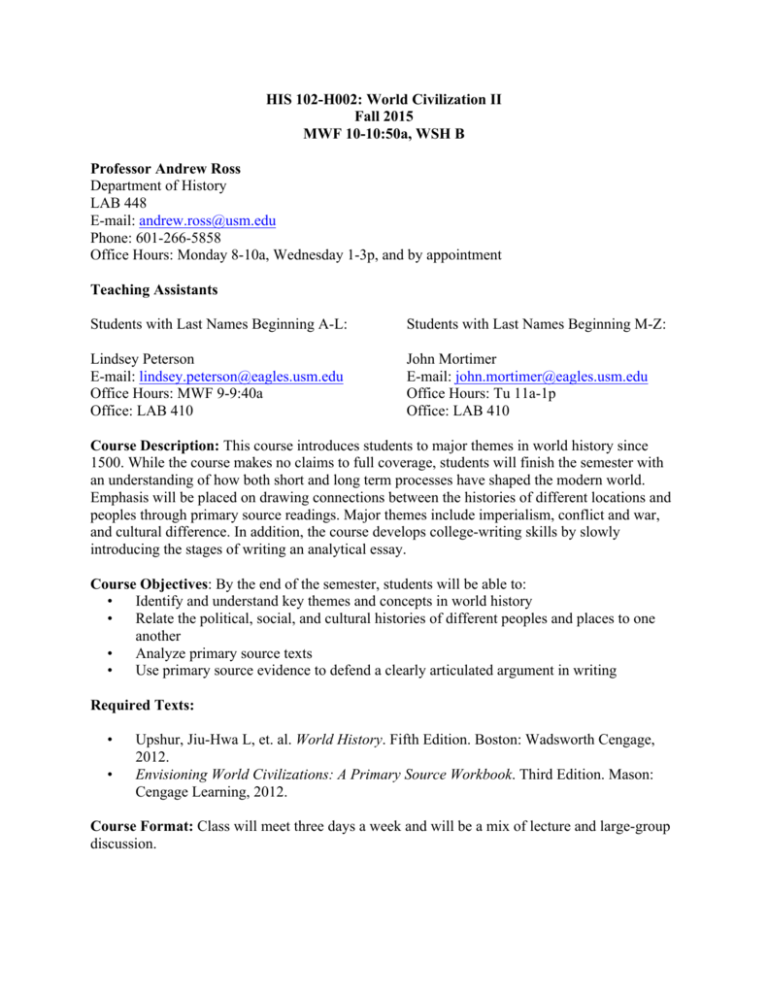
HIS 102-H002: World Civilization II Fall 2015 MWF 10-10:50a, WSH B Professor Andrew Ross Department of History LAB 448 E-mail: andrew.ross@usm.edu Phone: 601-266-5858 Office Hours: Monday 8-10a, Wednesday 1-3p, and by appointment Teaching Assistants Students with Last Names Beginning A-L: Students with Last Names Beginning M-Z: Lindsey Peterson E-mail: lindsey.peterson@eagles.usm.edu Office Hours: MWF 9-9:40a Office: LAB 410 John Mortimer E-mail: john.mortimer@eagles.usm.edu Office Hours: Tu 11a-1p Office: LAB 410 Course Description: This course introduces students to major themes in world history since 1500. While the course makes no claims to full coverage, students will finish the semester with an understanding of how both short and long term processes have shaped the modern world. Emphasis will be placed on drawing connections between the histories of different locations and peoples through primary source readings. Major themes include imperialism, conflict and war, and cultural difference. In addition, the course develops college-writing skills by slowly introducing the stages of writing an analytical essay. Course Objectives: By the end of the semester, students will be able to: • Identify and understand key themes and concepts in world history • Relate the political, social, and cultural histories of different peoples and places to one another • Analyze primary source texts • Use primary source evidence to defend a clearly articulated argument in writing Required Texts: • • Upshur, Jiu-Hwa L, et. al. World History. Fifth Edition. Boston: Wadsworth Cengage, 2012. Envisioning World Civilizations: A Primary Source Workbook. Third Edition. Mason: Cengage Learning, 2012. Course Format: Class will meet three days a week and will be a mix of lecture and large-group discussion. Course Requirements: Students are required to complete all assignments in order to pass this course. 1. Attendance: Attendance in class is a requirement in order to pass this course. Assigned seating will be used in order to take roll everyday. It is your responsibility to ensure that you sit in your assigned seat. Students who miss more than five classes will have their final grade lowered a letter grade; students who miss more than eight classes will automatically fail the course. 2. Readings: Complete all readings for the day they are listed on the syllabus. Readings not included in our class texts will be available on Blackboard or online. All primary source readings (including those available online) must be brought with you to class; you may leave your textbook at home. 3. Reading Quizzes: Ten reading quizzes will be given through the semester on dates of my choosing. Each quiz will consist of between one and five questions on the day’s reading. Your lowest two quiz scores will not count towards your final grade. Reading quizzes assess attendance and your work for the particular day they are given; therefore, no makeups will be provided for a missed reading quiz. 4. Exams: Three exams will be given on the dates listed below. Format for all exams will be a mix of identification and essay. IDs require you to identify the title, author (if applicable), approximate date, and significance of a quote or term. Essays require you to respond to a question with a clear argument, logical organization, and direct reference to lecture and reading materials. Further details will be provided in class and in a handout. 5. Homework: You will complete five homework assignments during the first two-thirds of the course. These assignments refer to the exercises found at the end of the relevant primary source in Envisioning World Civilizations. The goal of the homework assignments is to slowly build your ability to use primary source evidence to write your own college-level analytical essay. All homework assignments should be a paragraph long, but no longer than one page. Paragraphs must be complete, featuring a clear topic and concluding sentence and several body sentences. Homework will be graded on a High Pass (100%), Pass (85%), Low Pass (70%), and Fail (50%) scale. All homework is due before class on the due date via Turnitin on Blackboard. 6. Essays: You will complete two essays in response to a prompt provided by me. Essay 1 will utilize the paragraphs you write for your homework to answer the question. You will therefore be tasked with revising those paragraphs and writing an introduction and conclusion. Essay 2 requires you to choose your own sources, draft the essay, and revise it on your own. Handouts with further details will be provided at the beginning of Parts 2 and 3 of the course. Essays are due before class on the due date listed below. All essays will be submitted using Turnitin on Blackboard. Grade Breakdown: Homework: 5% Reading Quizzes: 10% Exams: Exam 1: 15% Exam 2: 20% Exam 3: 20% Essays: Essay 1: 15% Essay 2: 15% Grade Scale: • • • • • A: 90 - 100% B: 80 - 89% C: 70 - 79% D: 60 - 69% F: 59% and below Optional Course Activities: 1. Collaborative Note-taking: Students who prefer using their laptops to take notes have the opportunity to participate in an experiment in collaborative note-taking using Google Docs. Participating students will be formed into small groups who will take notes during class using a single Google Document. In other words, multiple students will take notes on the same page. This experiment is being offered as a way of gauging our ability to interact with one another even in a large class, while also trying to overcome some of the limitations of typing notes. No extra credit will be offered for participating in this experiment and only students serious about taking good notes in class will be allowed to participate. I will be monitoring progress throughout the semester. If you are interested in participating, please contact me at andrew.ross@usm.edu by Monday, August 24. 2. World Civilization Film Series: Every semester, the history department organizes a film series of world cinema to which all students taking World Civilization are invited to attend. A schedule of films will be handed out in class and will be available at the history department website at www.usm.edu/history. Two extra credit points will be awarded to students who view a film and write a one-paragraph reflection, sent to Prof. Ross at andrew.ross@usm.edu. You may complete a total of two responses, for a possible total of four extra credit points. Extra credit points will be added to your final reading quiz grade at the end of the semester. No extra credit will be awarded to any student who fails to complete a required assignment. Resources for HIS 102: 1. History Lab: As a student in HIS 101 or HIS 102, there is a special place you can go to get help while studying for exams or writing History papers, or simply to chat about class material or your assignments. Your course fees pay for the History Lab, a support center staffed by History graduate students. The History Lab is located on the fourth floor of the LAB in room 458. The lab will open on Monday, August 24th and will be open this semester Mondays through Thursdays from 9-5 and on Fridays from 9-2. You can make an appointment by stopping by, going to the website, or emailing HistoryLab@usm.edu. For more information, check out the History Lab on the History Department’s website http://www.usm.edu/history/history-lab-his-101102 2. Student Success Center: The First Year Initiative offers tutoring services for students enrolled in HIS 101 and HIS 102. In addition, First Year Initiative offers academic coaching services on time management, note taking, study skills, goal setting, and learning skills for first year. For more information or to schedule a tutoring session, see their website: http://www.usm.edu/success/academic-help. 3. Writing Center: The Writing Center is a free tutorial service available to any USM student who wants assistance with a writing project. We offer one-on-one writing instruction that’s designed to help students become more effective writers. This tutorial service is offered on a walk-in basis or by appointment (on the hour for 45 minutes). Make an appointment using the online scheduler today (https://usm.mywconline.com/). Walk-ins are also available depending on tutor availability. Call (601) 266-4821 or stop by The Writing Center (located on the first floor of Cook Library just past Starbucks). Their website is: http://www.usm.edu/writing-center 4. Supplemental Instruction: This course features a Special Instruction Leader, a former HIS 102 student who will attend class and offer optional group discussions throughout the semester. These discussion sections are meant to assist students in retaining and understanding course material. Further information will be available early in the semester. Course Policies: 1. Grade Concerns: Both your TAs and I are happy to discuss any concerns you have about your grade and how to improve your work. Please see your assigned TA about a specific grade before making an appointment with me. 2. Late Assignments: Late assignments will be deducted one grade for each day late. If we have not received an assignment after four days you will automatically fail the assignment. 3. Contacting Me: The best way to get in touch with me is through e-mail (mailto:andrew.ross@usm.edu). In order to guarantee a rapid response, e-mails should include a clear subject, your name, the course the message is regarding, and your question or message. Do not forget to include a salutation and closing. Further information on e-mail etiquette can be found at http://www.usm.edu/artsletters/now/student-resources/email-etiquette.html. Please allow 24 hours for a response to any e-mail. If you have not heard from me in that time, you may send me another note. Do not hesitate to contact me should you have any questions regarding the course material or any other concerns, but I will not respond to questions that can be answered by reading the syllabus. My office hours and office phone number are at the top of this syllabus; if those times are not convenient for you I am happy to make other arrangements. 4. Technology in the Classroom: • Phones: All phones must be on silent (not vibrate) or turned off during class. • Recording Devices: No recording of a class lecture is permitted without my explicit written permission. • Computers and Tablets: Feel free to use your laptop or tablet to take notes if that suits you, but refrain from using such devices for tasks unrelated to the class. Note that research consistently demonstrates that students retain information more readily by taking notes by hand. • PowerPoint Slides: All PowerPoint slides will be posted on Blackboard after class. 5. Classroom Environment: As in most college courses, this class encourages a high level of active engagement, sometimes with controversial and sensitive material. Some of this material may challenge received wisdom, contrast with your personal beliefs, or make you otherwise uncomfortable. Please help us foster an atmosphere that encourages critical reflection on and greater understanding of these issues by always remaining respectful to your peers, even when you disagree. I am always available to discuss course material or class discussion one-on-one during office hours or by appointment. All student activities in the University, including this course, are governed by the University’s “Policy on Classroom Responsibilities of Faculty and Students,” as outlined in the Student Handbook and here: http://www.usm.edu/provost/classroom-conductpolicy. Students who engage in behavior that disrupts the learning environment may be asked to leave the class. 6. Academic Honesty: Scholastic dishonesty will not be condoned under any circumstance in this course. See the current Undergraduate Bulletin (http://www.usm.edu/registrar/bulletins) or the Student Handbook (http://www.usm.edu/sites/default/files/groups/division-studentaffairs/pdf/67251_nobleed.pdf) for a definition of such behavior. Demonstrated plagiarism on a paper or cheating on an exam or quiz will automatically lead to a grade of “F” for the course and can result in dismissal from the university. The course will use the Turnitin.com service to detect plagiarism. Please see me during office hours if you have any questions regarding this policy. Ignorance of this policy or of the definition of plagiarism will not excuse instances of academic dishonesty. ADA Syllabus Statement: If a student has a disability that qualifies under the Americans with Disabilities Act (ADA) and requires accommodations, he/she should contact the Office for Disability Accommodations (ODA) for information on appropriate policies and procedures. Disabilities covered by ADA may include learning, psychiatric, physical disabilities, or chronic health disorders. Students can contact ODA if they are not certain whether a medical condition/disability qualifies. Address: The University of Southern Mississippi Office for Disability Accommodations 118 College Drive # 8586 Hattiesburg, MS 39406-0001 Voice Telephone: 601.266.5024 or 228.214.3232 Fax: 601.266.6035 Individuals with hearing impairments can contact ODA using the Mississippi Relay Service at 1.800.582.2233 (TTY) or email Suzy Hebert at Suzanne.Hebert@usm.edu. Web: http://www.usm.edu/oda Course Schedule: Part 1: The Age of Exploration Learning Objectives: 1) Identify and describe some of the major world powers in the early modern world 2) Understand the processes that motivated European exploration and conquest 3) Describe the how and why civilizations throughout the world changed over time Big Question: How and why did European exploration transform the early modern world? What did that transformation entail? Skill Objectives: 1) Analyze individual primary sources in writing 2) Write an in-class exam essay 3) Respond to an identification question Big Skill: Be able to understand and analyze difficult texts, explain their meaning, and situate them in a broader context Week 1 Wednesday, August 19: Theme: Introductions Reading: None Friday, August 21: The World in 1500 Reading: Envisioning World Civilizations (EWC) pp. 15-30 Week 2 Monday, August 24: Working with Primary Sources Reading: World History (WH), pp. 413-428; EWC pp. 1-14; doc. 8.12 Wednesday, August 26: Theme: The Age of Exploration Reading: WH, pp. 445-451; EWC doc. 9.9; 9.12 Last day to drop and receive 100% financial credit; Last day to add/drop without instructor permission Friday, August 28: The Indian Ocean Trade Reading: WH, pp. 513-525; EWC doc. 9.17; 10.1 HOMEWORK DUE: Exercise 9.12 before class Week 3 Monday, August 31: The Aztec and Inca Empires Reading: EWC, doc. 9.14 Wednesday, September 2: The Colonization of the “New World” Reading: WH, pp. 496-509; EWC, doc. 9.16 Friday, September 4: Theme: Crises of the Early Modern World Reading: EWC, doc. 11.1 HOMEWORK DUE: Exercise 9.16 before class Week 4 Monday, September 7: No Class (Labor Day) Wednesday, September 9: Renaissance and Reformation in Europe Reading: WH, pp. 463-491; EWC, docs. 9.3; 9.8 Friday, September 11: From Ming to Qing Dynasties in China Reading: WH, pp. 537-562; EWC, docs. 10.6-10.8; 10.11 Week 5 Monday, September 14: The Slave Trade Reading: WH 491-496; EWC, docs. 9.17; 11.19 HOMEWORK DUE: Exercise 10.7 before class Wednesday, September 16: Exam Review Friday, September 18: Part 1 Exam Part 2: The Age of Revolution Learning Objectives: 1) Explain the growing dominance of European power throughout the world 2) Identify the global significance of changing conceptions of human equality and freedom 3) Recognize and explain the persistence of forms of inequality both internationally and nationally Big Question: How can we explain growing forms of inequality, both within and between different countries, in an era that also witnessed the development of new understandings of human equality? Skill Objectives: 1) Write an introduction and conclusion 2) Link together assigned primary source documents into a single essay Big Skill: Relate different texts to one another in order to make a larger claim. Week 6 Monday, September 21: Theme: The Age of Revolution Reading: WH, pp. 596-605; EWC, docs. 11.12-11.13 Wednesday, September 23: The American Revolution Reading: WH, pp. 618-629; EWC, doc. 11.16 HOMEWORK DUE: Exercise 11.13 Friday, September 25: The French Revolution Reading: WH, pp. 645-665; EWC, docs. 12.2-12.3 Week 7 Monday, September 28: The Haitian Revolution Reading: Documents on the Haitian Revolution (Available on Blackboard) HOMEWORK DUE: Exercise 12.3 Wednesday, September 30: Theme: Liberalism and its Discontents Reading: WH, pp. 576-579; EWC, doc. 12.17; Adam Smith, excerpt from “The Wealth of Nations” (Blackboard) Friday, October 2: Industrialization in Great Britain Reading: WH, pp. 634-642; EWC, docs. 12.16; 12.21 Week 8 Monday, October 5: The Opium Wars Reading: WH, pp. 741-742; “Commissioner Lin: Letter to Queen Victoria, 1839” (http://www.fordham.edu/halsall/mod/1839lin2.asp) Wednesday, October 7: The Rise of Japan Reading: WH, pp. 562-575, 743-745; EWC, docs. 13.11; 13.13-13.14 Friday, October 9: Socialism Reading: WH, 672-675; 699-701; Karl Marx and Friedrich Engels, Manifesto of the Communist Party (Blackboard) Week 9 Monday, October 12: Theme: Nationalism and Empire Reading: WH, pp. 642-644; EWC, docs. 13.1-13.2 Wednesday, October 14: Latin American Independence Reading: WH, pp. 611-618, 669-672; EWC, doc. 12.8 Friday, October 16: The Unification of Germany Reading: WH, pp. 680-682; EWC, doc. 12.15 Week 10 Monday, October 19: The Scramble for Africa Reading: WH, pp. 719-731; EWC, docs. 13.3-13.4 DUE: Essay 1 before class Wednesday, October 21: Exam Review Friday, October 23: No Class (Fall Break) Week 11 Monday, October 26: Part 2 Exam Part 3: The Age of Total War Learning Objectives: 1) Identify and define the two primary challenges to liberalism in the twentieth century: communism and fascism 2) Compare and contrast the two world wars of the twentieth century 3) Recognize the consequences of the era of total war for the Third World Big Question: Why did people seek out extreme alternatives to the world order that was built during the previous centuries? Skill Objectives: 1) Independently collect primary source evidence that supports a historical argument 2) Construct a short essay using that evidence 3) Relate historical phenomena from a broad time span to one another in order to answer a cumulative essay question Big Skill: Conduct basic research in order to defend an original argument. Wednesday, October 28: Theme: The Crisis of Liberalism Reading: WH, pp. 716-718; EWC, doc. 15.1 Friday, October 30: World War I Reading: WH, pp. 750-767; EWC, doc. 13.16 Last day to withdraw and receive a grade of W Week 12 Monday, November 2: The Russian Revolution Reading: WH, pp. 815-826; EWC, doc. 14.7 Wednesday, November 4: Fascism Reading: WH, pp. 849-852; Mussolini, “Born of a Need for Action” (Blackboard) Friday, November 6: No Class (Conference Travel) Week 13 Monday, November 9: Theme: Genocide Reading: WH, pp. 854-861; EWC, doc. 15.3 Wednesday, November 11: Nazi Germany Reading: WH, pp. 861-864; EWC, doc. 15.5-15.6 Friday, November 13: World War II Reading: WH, pp. 866-880; EWC, docs. 15.7-15.8 Week 14 Monday, November 16: The Holocaust Reading: WH, pp. 880-893; EWC, docs. 15.9-15.10 Wednesday, November 18: Theme: Decolonization Reading: WH, pp. 783-785, 909-912; EWC, docs. 14.1; 16.5 Friday, November 20: Indian Independence Reading: WH, pp. 912-916; EWC, doc. 14.5; Gandhi, excerpt from Essential Writings (Blackboard) Week 15 Monday, November 23: The Algerian War Reading: WH, pp. 916-923; Fanon, excerpt from The Wretched of the Earth (Blackboard) DUE: Essay 2 before class Wednesday, November 25: No Class (Thanksgiving Break) Friday, November 27: No Class (Thanksgiving Break) Week 16 Monday, November 30: Theme: Globalization Reading: WH, pp. 963-965; EWC, docs. 17.5; 17.7 Wednesday, December 2: The Cold War Reading: WH, pp. 893-905; EWC, docs. 16.3; 16.6 Friday, December 4: Conflicts in the Middle East Reading: WH, pp. 923-930; 977-978, 981-986; EWC 16.4; 17.4 Final Exam: Wednesday, December 9, 10:45a – 1:15p
